11 start with C start with C
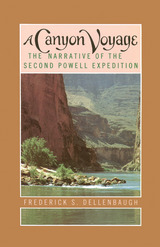
"One of the seminal books on western history . . . The author was only 17 when he began the expedition, and he honestly hero-worshipped Powell all his life. Yet this bright, sharp account is so detailed and truthful that the reader can see through his enthusiasm to discover Powell's mean spirit and sometimes reckless nature. It's also a great river-running book." —Deseret News
"It was decidedly worth writing, this detailed record: a more absorbing, and at times stirring, story of adventure has not seen the light in a long time, and the author's unadorned, yet vivid, style enables the reader to share all the emotions of the explorers:" —The Nation
"In these later years (1909) when amateur travel in the west is frequent, a detailed record of this kind will be of value to seekers after adventure." —Science
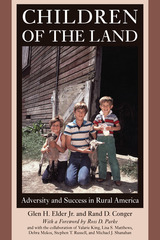
In Children of the Land, the authors ask whether traditional observations about farm families—strong intergenerational ties, productive roles for youth in work and social leadership, dedicated parents and a network of positive engagement in church, school, and community life—apply to three hundred Iowa children who have grown up with some tie to the land. The answer, as this study shows, is a resounding yes. In spite of the hardships they faced during the agricultural crisis of the 1980s, these children, whose lives we follow from the seventh grade to after high school graduation, proved to be remarkably successful, both academically and socially.
A moving testament to the distinctly positive lifestyle of Iowa families with connections to the land, this uplifting book also suggests important routes to success for youths in other high risk settings.
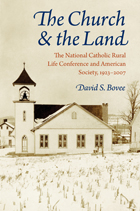
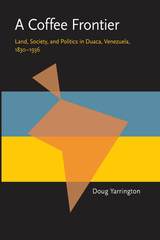
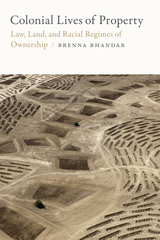
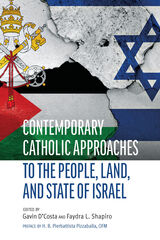
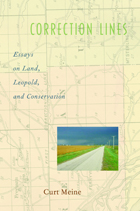
Correction Lines is a new collection of essays from one of our most thoughtful and eloquent writers on conservation, putting these recent changes into perspective and exploring the questions they raise about the past, present, and future of the conservation movement. The essays explore interrelated themes: the relationship between biological and social dimensions; the historic tension between utilitarian and preservationist approaches; the integration of varied cultural perspectives; the enduring legacy of Aldo Leopold; the contrasts and continuities between conservation and environmentalism; the importance of political reform; and the need to "retool" conservation to address twentyfirst-century realities.
Collectively the essays assert that we have reached a critical juncture in conservation—a "correction line" of sorts. Correction Lines argues that we need a more coherent and comprehensive account of the past if we are to understand our present circumstances and move forward under unprecedented conditions.
Meine brings together a deep sense of history with powerful language and compelling imagery, yielding new insights into the origins and development of contemporary conservation. Correction Lines will help us think more clearly about the forces that have changed, and are changing, conservation, and inspire us to address current realities and future needs.
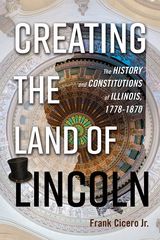
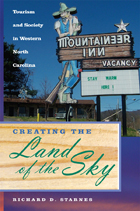
A sophisticated inquiry into tourism's social and economic power across the South.
In the early 19th century, planter families from South Carolina, Georgia, and eastern North Carolina left their low-country estates during the summer to relocate their households to vacation homes in the mountains of western North Carolina. Those unable to afford the expense of a second home relaxed at the hotels that emerged to meet their needs. This early tourist activity set the stage for tourism to become the region's New South industry. After 1865, the development of railroads and the bugeoning consumer culture led to the expansion of tourism across the whole region.
Richard Starnes argues that western North Carolina benefited from the romanticized image of Appalachia in the post-Civil War American consciousness. This image transformed the southern highlands into an exotic travel destination, a place where both climate and culture offered visitors a myriad of diversions. This depiction was futher bolstered by partnerships between state and federal agencies, local boosters, and outside developers to create the atrtactions necessary to lure tourists to the region.
As tourism grew, so did the tension between leaders in the industry and local residents. The commodification of regional culture, low-wage tourism jobs, inflated land prices, and negative personal experiences bred no small degree of animosity among mountain residents toward visitors. Starnes's study provides a better understanding of the significant role that tourism played in shaping communities across the South.
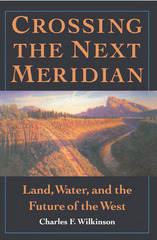
In Crossing the Next Meridian, Charles F. Wilkinson, an expert on federal public lands, Native American issues, and the West's arcane water laws explains some of the core problems facing the American West now and in the years to come. He examines the outmoded ideas that pervade land use and resource allocation and argues that significant reform of Western law is needed to combat desertification and environmental decline, and to heal splintered communities.
Interweaving legal history with examples of present-day consequences of the laws, both intended and unintended, Wilkinson traces the origins and development of the laws and regulations that govern mining, ranching, forestry, and water use. He relates stories of Westerners who face these issues on a day-to-day basis, and discusses what can and should be done to bring government policies in line with the reality of twentieth-century American life.
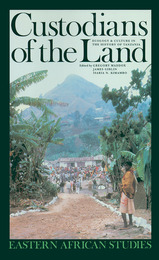
Farming and pastoral societies inhabit ever-changing environments. This relationship between environment and rural culture, politics and economy in Tanzania is the subject of this volume which will be valuable in reopening debates on Tanzanian history.
In his conclusion, Isaria N. Kimambo, a founding father of Tanzanian history, reflects on the efforts of successive historians to strike a balance between external causes of change and local initiative in their interpretations of Tanzanian history.
He shows that nationalist and Marxist historians of Tanzanian history, understandably preoccupied through the first quarter-century of the country's post-colonial history with the impact of imperialism and capitalism on East Africa, tended to overlook the initiatives taken by rural societies to transform themselves.
Yet there is good reason for historians to think about the causes of change and innovation in the rural communities of Tanzania, because farming and pastoral people have constantly changed as they adjusted to shifting environmental conditions.
READERS
Browse our collection.
PUBLISHERS
See BiblioVault's publisher services.
STUDENT SERVICES
Files for college accessibility offices.
UChicago Accessibility Resources
home | accessibility | search | about | contact us
BiblioVault ® 2001 - 2024
The University of Chicago Press









